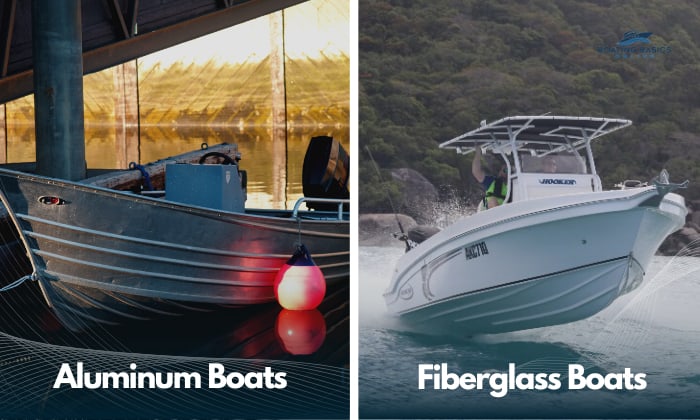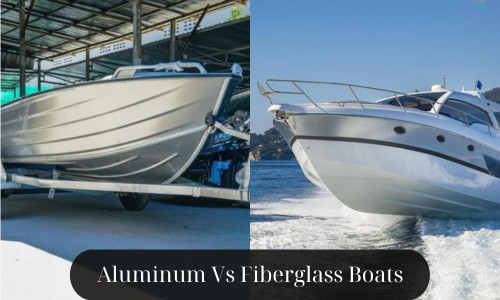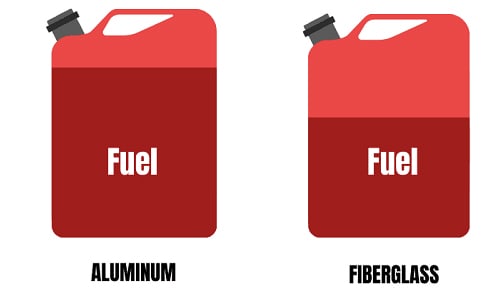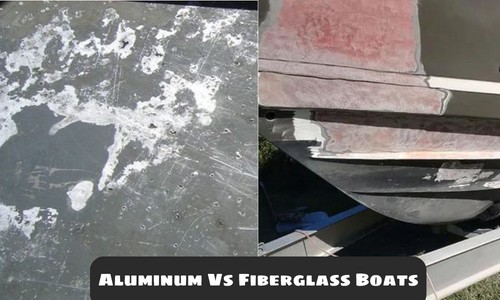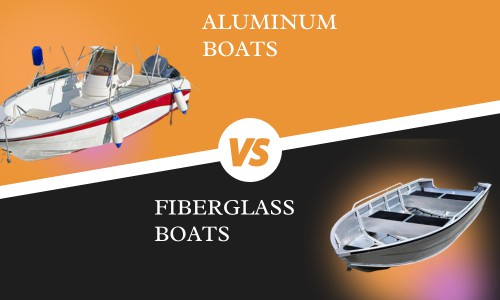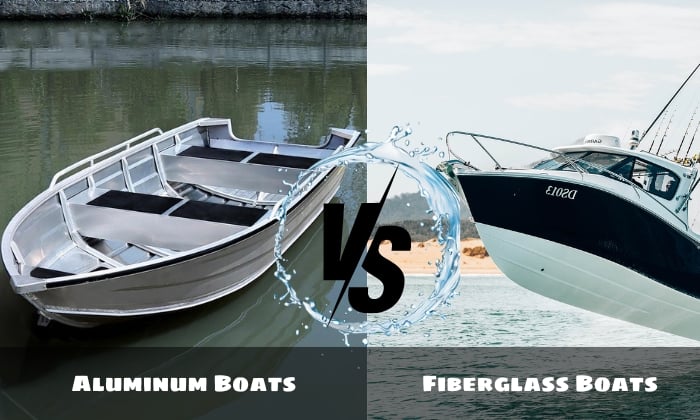If there’s a debate in the boating world that’s worthy of the “unending” tag, aluminum vs fiberglass boats undoubtedly meet the criteria. It’s been raging on for years for the sole fact that both hull materials bring something unique and valuable to the table.
Is that really the case? Well, that’s exactly the purpose of this guide. To give an objective look at the pros and cons of aluminum and fiberglass boats, especially in important areas such as durability, maneuverability, cost, etc.
| Vital Factors | Aluminum Watercraft | Fiberglass Watercraft |
| Strength and Durability | Can resist impact | Normally have thick hulls that are weather-resistant but have a chance to can crack and delaminate |
| Maneuverability and Weight | Easier to launch and maneuver due to being lighter | Heavier and generally more difficult to maneuver but more stable |
| Cost | Usually more affordable | Expensive initial cost |
| Fuel Consumption | Offers more fuel economy | Higher operating cost |
| Corrosion | Corrosion-resistant but not corrosion-proof | Highly corrosion-resistant |
| Maintenance | You need to stay on top of corrosion | Generally not as hard to maintain unless the boat comes with other materials like wood |
| Noise | Tends to be noisy | Quiet operation |
| Customization | Limited customizations | More amenable to being customized |
| Aesthetics | Tends to have an industrial, unattractive look for most people | Preferred for its generally aesthetically-pleasing look |
| Water Activity | Tends to be better for most kinds of inland, freshwater fishing | More suitable for recreational activities like wakeboarding |
Table of Contents
Comparing Aluminum vs Fiberglass Boat
When we’re talking about these materials, we’re really referring to the hull. That’s why some people make the analogy of a tin can vs a high-end bathtub when comparing an aluminum boat vs fiberglass vessel. Obviously, that immediately connotes one is the el cheapo, inferior kind.
In reality, though, both materials deserve a more nuanced view with the following points:
1. Durability and Strength
There’s really no “weaker” material in this case as both aluminum and fiberglass can be sufficiently tough (it’s why they’re among the top construction materials used by boat manufacturers in the first place).
- Fiberglass boats can last for decades due to their natural durability. Also, it’s not like all collisions will result in cracking. And, manufacturers can always design thicker hulls with proper gelcoat thickness factored in.
- Aluminum boats are normally considered stronger, as they only bend (rather than crack) during a collision.
So, if you’re still having doubts and wondering, “Are fiberglass boats good for long-term boating?”, the fact that they can last long (if you don’t subject them to numerous collisions) should convince you.
2. Maneuverability, Weight, and Fuel Consumption
Lightweight materials always pave the way to more maneuverability, as well as the palpable agility and responsiveness that anglers love in their boats. This benefit is almost always tied to aluminum hulls, which have been preferred even in the most opulent yachts for their efficient fuel consumption and potential to achieve higher speeds.
Fiberglass boats may not offer the same maneuverability advantage and use up more fuel. But they can use their heft to their advantage by making the vessel more stable and capable of handling choppy waters.
For anyone curious, this should sufficiently answer the question, “Which boat is heavier?”
3. Cost
In boats, aluminum is the ready cheap alternative to fiberglass, and this statement really has a largely positive connotation.
- If I’m going to be using a boat mainly for freshwater fishing, I’d choose an aluminum fishing boat. Again, that only underscores the importance of matching your material type with your purpose.
- Fiberglass boats are the opposite since they tend to be larger vessels, which aren’t easy to construct without additional expense.
4. Corrosion
There’s no room to question aluminum’s naturally rust-resistant property. Corrosion is a different story, though, and most boat owners have to rely on protective coatings to beat it. This spells trouble if you frequently use the boat in saltwater.
Obviously, fiberglass shines in this regard since it’s a prime example of a corrosion-resistant material. Notice how I didn’t say immune? Yes, fiberglass does still corrode through processes like erosion and electro-chemical corrosion, but it’s not always apparent since usually occurs in the hidden crevices and underneath the surface
5. Maintenance and Repair
Fiberglass is the clear winner here for most, but we can’t deny the points made for aluminum. Consider the following facts:
- Fiberglass watercraft have earned a reputation for being close to maintenance-free.
- Fiberglass boats can be buffed to remove scratches, fading, and other minor damage on the gel coat’s surface. This is impossible with an aluminum hull, regardless of any polishing you do.
- Aluminum boats don’t need a gel coat that needs to be waxed regularly. They have cheaper repair costs, too.
6. Customization and Aesthetics
This is among the top disadvantages of aluminum boats. They simply don’t provide the same freedom in customizing that fiberglass boats readily offer.
Nowadays, fiberglass boat manufacturers won’t run out of more intricate hull shapes and styles. This is all thanks to the fact that almost any fiberglass vessel can be built using a custom mold.
Pros and Cons of an Aluminum Boat
- An almost perfect choice for freshwater or inland fishers
- Can take blunt impact better
- Doesn’t cost an arm and a leg
- Generally lightweight
- Uses less fuel
- Offers better maneuverability
- Noisier
- Has corrosion as a main weakness
- Limited design customizations
- Leaks can be an issue
- May not handle choppy water as well as fiberglass boats
Pros and Cons of a Fiberglass Boat
- Leaves you with plenty of room to customize your design
- Corrosion virtually not a problem
- More aesthetically pleasing
- Proven to have great longevity
- Handles rough water well
- Overall more versatile
- May crack with enough force from an impact
- Not budget-friendly
- Requires more fuel to the trailer and drive in general
Which One Is Better?
There’s no clear winner in the fiberglass vs aluminum boats debate so the best answer to this will always be the one that matches your preferences and requirements. If I’m an angler that frequents freshwater lakes and is a little budget-constrained, why would I go for anything other than aluminum for my boat hull?
However, if I’m more the type of boater who wants versatility in my vessels, I’d be more inclined to choose a fiberglass boat.
Conclusion
Given the conclusion we’ve arrived at after comparing aluminum vs fiberglass boats, there’s no denying that you really have to figure out which material that suits you best, once you know the strengths and weaknesses of either one.

“My intention from the first day establishing Boating Basics Online is to provide as much help as possible for boaters who want to experience a first safe and convenient trip. So feel free to join us and share your beautiful journeys to the sea!”

